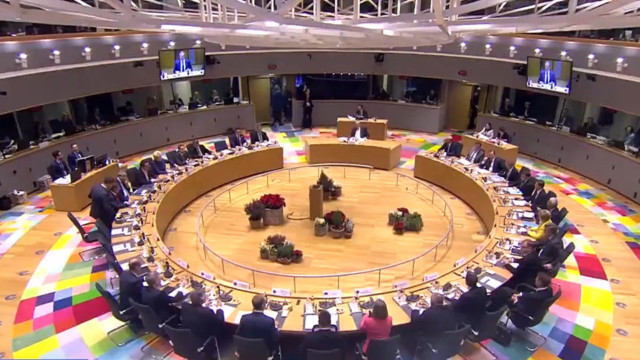British Prime Minister Theresa May is in Brussels with other European leaders. Defense – not Brexit – dominated the agenda, along with the EU’s cooperation when it comes to security. CGTN’s Mariam Zaidi reports.
Follow Mariam Zaidi on Twitter @zaidi_mariam
The last EU summit before Christmas, and just before proceedings officially kicked off, some good news for EU solidarity.
Following EU Council President Donald Tusk’s climb down on enforcing EU refugee quotas on member states, the Czech Republic, Hungary, Poland and Slovakia finally embraced EU migration policy, committing about $41-million.
Hungarian Prime Minister Viktor Orban said, “Four countries are ready to contribute a considerable sum of money to defense (sic) the outside border of European Union and contribute to the actions of European Union initiated in the territory of Libya.”
But Thursday’s big draw was the realization of a ten-year military ambition, or as EU Commission President Jean-Claude Juncker called it, “the sleeping beauty” of the 2007 Lisbon Treaty.
With growing Russian aggression and heightened security due to terrorism, EU leaders gave official consent to establishing permanent European cooperation in security and defense.
“We see that around the world there is a strong need for the European Union to be active as a point of reference, as a player, as others are taking different directions,” said Federica Mogherini, the EU Foreign Affairs Chief.
NATO Secretary General Jens Stoltenberg said, “I welcome the initiative to strengthen European defense because I believe that it will be good for the European Union, for Europe and for NATO. It can provide more capabilities, more defense spending, and fair burden sharing.”
Under PESCO, 25 European countries provide troops and assets for joint missions. They share information, resources and funding. Seventeen projects are already up and running and there are plans to set up an EU command center and logistic hubs across the bloc.
“More than half a century ago, an ambitious vision of the European defense community was created, but what was missing was the unity and courage to put it into practice,” said EU Council President Donald Tusk.
“PESCO is not only good news for us, but it is also good news for our allies and bad news for our enemies.”
After securing a deal on phase one of Brexit last week, Thursday should have been a victorious return for Theresa May to the EU capital. Facing the cameras after Tory rebels defeated her government on the UK Brexit bill Wednesday night, May was positive, saying the UK is still on course to deliver on Brexit.
On Friday, the other 27 EU leaders will likely green light opening trade talks. But draft guidelines for the summit show those talks won’t start till sometime in March.
 CGTN America
CGTN America
